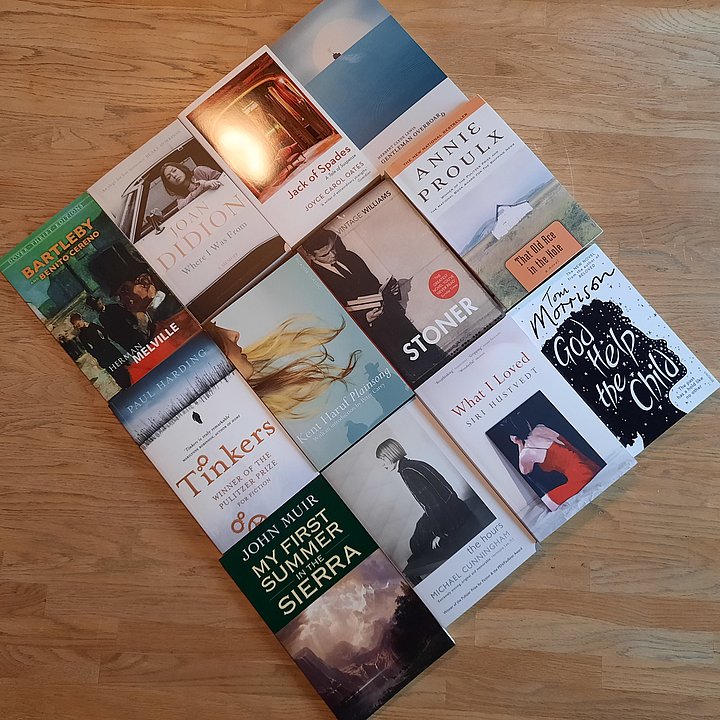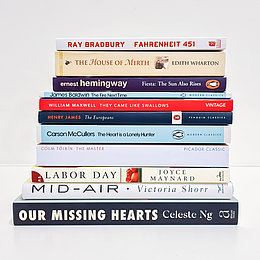Losgelesen!
Der Amerikahaus Literary Circle ist ein kostenloser, öffentlicher, englischsprachiger Buchclub. Die Treffen finden (in der Regel) am ersten Mittwoch eines jeden Monats im Amerikahaus in München statt.
Die Titel werden zweimal im Jahr von den Mitgliedern vorgeschlagen und abgestimmt.
Der Amerikahaus Literary Circle wird vom Amerikahaus Verein e.V. und der Stiftung Bayerisches Amerikahaus gGmbH gefördert.
Foto: ©Amerikahaus München
Bitte beachten Sie: Das Literary Circle-Treffen zu Michael Cunnighams The Hours wurde auf Mittwoch, 17. Juli 2024, verschoben.
Termine und Bücher für 2024
Wednesday, January 17, 2024 (6:00 P.M. - 7:30 P.M.)
What I Loved by Siri Hustvedt
What I Loved is the tale of two families that meet by chance when Leo buys a painting by Bill, and they and their wives eventually become friends and neighbors. Both women become pregnant around the same time and their quiet domestic life is the subject of the first part of the book. However, tragedy strikes and relationships are torn asunder, at which point the gentle book begins to take on the mood of a thriller.
Wednesday, February 14, 2024 (6:00 P.M. - 7:30 P.M.)
Benito Cereno by Herman Melville
Originally serialized in 1855, Benito Cereno tells of the strange fate of a Spanish slave ship while hinting at the future ramifications of slavery in America. It is now regarded as one of Melville’s finest works. When an American whaling ship comes to the rescue of the Spanish vessel in distress, the American captain has to piece together what has happened and decide how to react. Race and morality underlie the suspense and mystery and give another dimension to the story. Merton M. Sealts, Jr. says the story is "an oblique comment on those prevailing attitudes toward blacks and slavery in the United States that would ultimately precipitate civil war between North and South".
Wednesday, March 6, 2024 (6:00 P.M. - 7:30 P.M.)
Stoner by John Williams
Stoner follows the semi-tragic figure William Stoner, who is born to a poor farming family and sent to university to study agriculture, where he instead becomes devoted to literature. His life as a scholar and professor never goes exactly to plan, and his various relationships seem to drift away from the ideal as well. Yet as his life goes on, Stoner slowly comes to be seen as a hero when contrasted with the cruel world around him.
Wednesday, April 10, 2024 (6:00 P.M. - 7:30 P.M.)
Where I Was From by Joan Didion
This collection of essays about California’s history and mythology incorporates Didion’s own experiences growing up there into the romantic notions about the state. Part historical document and part memoir, the state’s relationship with water, transport, the concept of freedom are told through the stories of its famous and infamous citizens, along with the contributions of the common man. By comparing the state’s reputation to the real story, the perception of what California is all about comes into question in an interesting and personal way.
Wednesday, May 15, 2024 (6:00 P.M. - 7:30 P.M.)
That Old Ace in the Hole by Annie Proulx
That Old Ace in the Hole takes place in rural Texas, where Bob Dollar is scouting locations to set up hog farms for the Global Pork Rind Corporation. He encounters resistance from the locals but persists, eventually becoming a part of the community as he finds a place to live and helps at the local café. But, as he gets closer to the people, he begins to question his way of life and the workings of the world.
Wednesday, June 5, 2024 (6:00 P.M. - 7:30 P.M.)
Gentleman Overboard by Herbert Clyde Lewis
Gentleman Overboard is the tale of a man who is suddenly in grave danger in the middle of the ocean after falling unnoticed from a ship between Honolulu and Panama. As he waits to be rescued, wondering if he has been missed, the suspense builds up as he hopes to avoid the same fate of the author of the book. As an author, Herbert Clyde Lewis was mostly forgotten by the time he died in 1950, only recently being properly rediscovered, mainly by the efforts of Brad Bigelow of the Neglected Books web site. The son of Russian immigrants to New York City, Lewis also worked as a newspaper reporter in America and China and on several Hollywood screenplays.
Wednesday, July 17, 2024 (6:00 P.M. - 7:30 P.M.)
The Hours by Michael Cunningham
Going back and forth between three different times and three different protagonists, this Pulitzer Prize winning novel follows the stories of three women affected by Virginia Woolf’s book Mrs. Dalloway. Intertwined are the distant lives and memories of Woolf herself in London as she writes the work, a disillusioned housewife in 1940s Los Angeles, and a 90s New York independent woman helping a dying friend. Themes of sexuality and mental illness overlap and evolve through the three stories.
Wednesday, August 7, 2024 (6:00 P.M. - 7:30 P.M.)
Plainsong by Kent Haruf
Following several families in the fictional town of Holt, Colorado, Plainsong is an acclaimed and delicate story of small town life. History teacher Tom Guthrie and his two sons cope with life without Tom’s wife, who has abandoned the family. A young neighbor becomes pregnant, is kicked out of her alcoholic mother’s house, and is taken in by rough bachelor brothers, while another teacher at the school struggles with her senile father.
Wednesday, September 4, 2024 (6:00 P.M. - 7:30 P.M.)
My First Summer in the Sierra by John Muir
Complete with sketches, Muir’s diary lets us follow him working as a shepherd in the mountains of central California and exploring the area in 1869. One of the American originators of the idea of conserving nature, John Muir is practically synonymous with America’s National Parks, and here we can see him starting to formalize his way of thinking as he interacts with the plants and animals, as well as other people, in the area.
Wednesday, October 2, 2024 (6:00 P.M. - 7:30 P.M.)
Jack of Spades by Joyce Carol Oates
Jack of Spades is the secret pen name of author Andrew Rush, a successful author who uses his alias to write violent masochistic thrillers. When his secret is accidentally discovered by his daughter, Rush’s life begins to spiral out of control and his entire career and family life are in danger, and the first signs of madness appear when he can hear Jack of Spades talking to him in his mind.
Wednesday, November 6, 2024 (6:00 P.M. - 7:30 P.M.)
God Help The Child by Toni Morrison
God Help the Child follows Bride and the people she meets, all of them in one way or another deeply affected by treatment they received from adults when they were children. Bride’s mother and father cannot love her as much as they should because of her much darker skin color. The novel follows the implications of that on her self-worth and how she conducts various relationships, whether with her boyfriend Booker or with family and friends. The nuances of the African American experience and the never-ending effects of a troubled childhood provide the texture for this acclaimed novel.
Wednesday, December 4, 2024 (6:00 P.M. - 7:30 P.M.)
Tinkers by Paul Harding
Paul Harding’s Pulitzer Prize winning debut novel tells the story of a man on his deathbed remembering both his life and his father’s. The beauty, fragility, and tragedy of life are expertly commented upon as George Crosby recollects losing his father at an early age, and reunites with him through memories, with the ongoing metaphor of clock repair setting the stage for the both the memories and the impending death.


